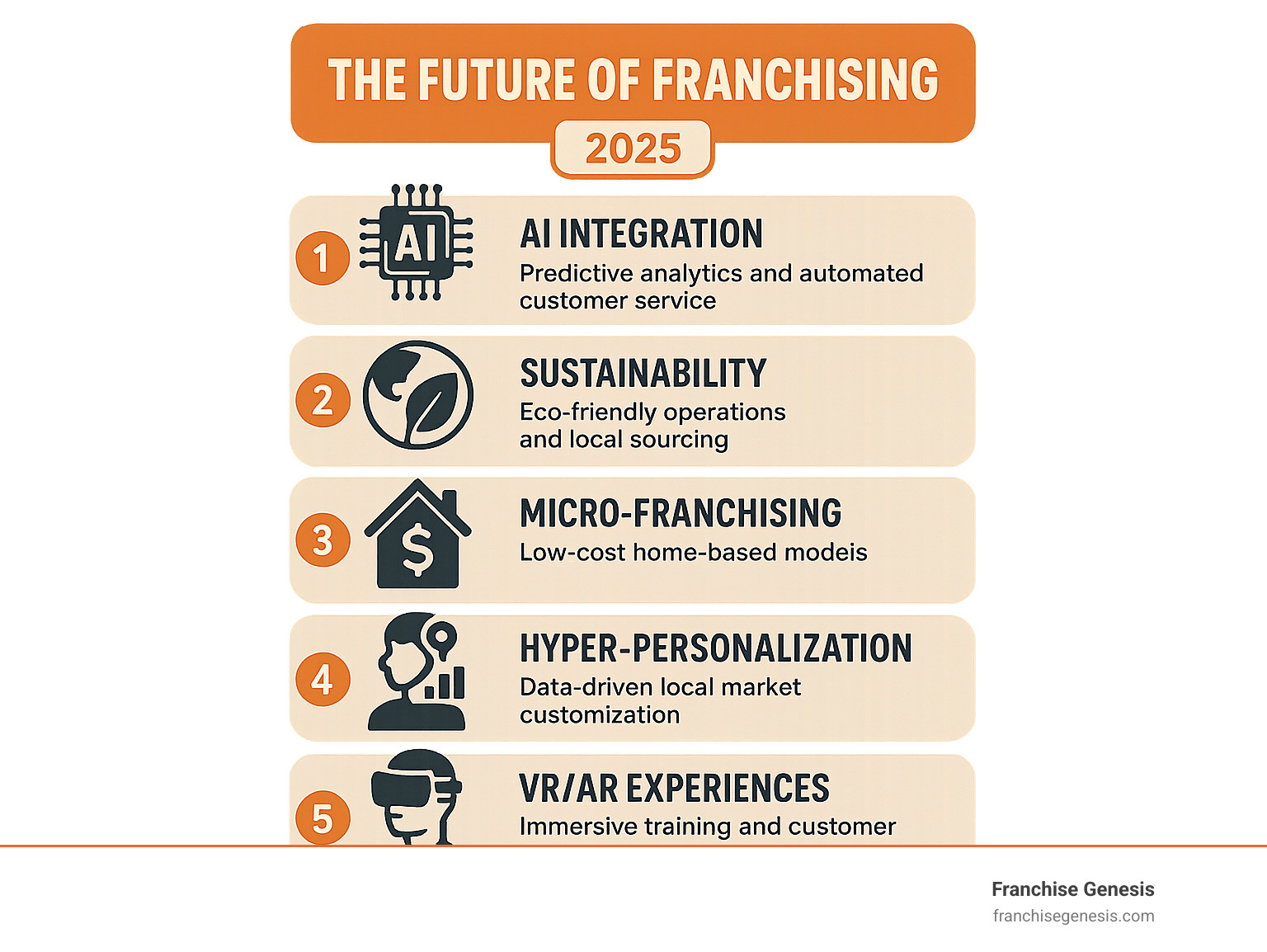Why Understanding the Future of Franchising is Critical for Business Growth
What is the future of franchising in an era where technology, consumer preferences, and work models are evolving at breakneck speed? The franchise industry is experiencing unprecedented change driven by five key forces:
- AI and Automation Integration – Streamlining operations and enhancing customer experiences
- Sustainability Focus – Meeting eco-conscious consumer demands and regulatory requirements
- Micro-Franchising Models – Lowering barriers to entry with flexible, home-based opportunities
- Hyper-Personalization – Using data analytics to tailor experiences to local markets
- VR/AR Training Systems – Revolutionizing franchisee education and support
The numbers tell a compelling story. In Canada alone, franchising now accounts for around 40% of retail sales and employs over 1 million people, contributing more than $120 billion to the GDP. By 2025, 22% of the U.S. workforce will be home-based, while micro-franchises are projected to represent over 50% of all new franchise openings by 2027.
These shifts aren’t just statistics – they represent massive opportunities for established business owners ready to expand through franchising. The brands that understand and adapt to these trends today will dominate tomorrow’s marketplace.
As Monique Pelle-Kunkle, Vice President of Operations at Franchise Genesis, I’ve guided countless business owners through the complexities of what is the future of franchising, helping them scale from single locations to nationwide networks. My experience includes launching an ABA therapy franchise that grew to over 100 locations in its first year, demonstrating how the right strategy can accelerate growth in today’s evolving landscape.

Quick what is the future of franchising definitions:
The Shifting Landscape: Economic, Consumer, and Workforce Trends
The franchise industry remains a guide of stability, even in shifting economic climates. Canada’s franchise sector, the 2nd largest globally, contributes over $120 billion to the GDP and employs over 1 million people, showcasing its resilience. This makes franchising an attractive expansion strategy when traditional growth is uncertain. Franchising offers a tested blueprint for success, a fact supported by the Canadian franchising overview.
However, the real opportunity lies in understanding the fundamental shifts in how people live, work, and spend. These permanent changes are creating new avenues for growth that savvy business owners can leverage. Understanding these macro trends is essential for any business owner considering franchising. For a deeper dive, explore why you should franchise.
How Demographic and Consumer Shifts Create New Opportunities
Today’s consumers are rewriting the rules. They prioritize experiences over possessions, fueling growth for entertainment and hospitality franchises. The health and wellness revolution continues, with consumers investing heavily in physical and mental well-being, creating demand for fitness, health food, and therapy services. Furthermore, eco-conscious consumers are voting with their wallets, making sustainability a core business requirement. Finally, the demand for convenience has reshaped industries, creating opportunities for home services, mobile businesses, and tech-enabled companies. These trends are also powering many B2B franchise opportunities in a convenience-driven economy.
Adapting Your Franchise Model to the New World of Work
The workplace revolution offers huge opportunities for franchisors. With 22% of the U.S. workforce expected to be home-based by 2025, it’s time to rethink operational models. This shift favors flexible employment and the gig economy, which included 72 million Americans in 2023. Businesses using fractional talent report faster growth and significant cost savings, a trend that service-based franchises can leverage.
This new landscape has caused Home-based franchise opportunities to explode in popularity. However, success in this new world of work requires a human-centered approach. Investing in people and fostering a positive culture is a competitive advantage. The future belongs to franchise systems that balance flexibility with support, technology with human connection, and efficiency with employee well-being. Getting this right will attract top-tier franchisees and drive success.
What is the Future of Franchising: Key Growth Models and Sectors

What is the future of franchising when it comes to business models and growth sectors? The answer lies in innovation and smart market adaptation. Traditional one-size-fits-all approaches are giving way to flexible, scalable models. Understanding these emerging patterns is essential for building a franchise system that thrives. The brands that accept these shifts today will dominate their sectors tomorrow. For a comprehensive look at how different industries are adapting, explore franchise opportunities in all industries.
Emerging Franchise Models for Agile Growth
Micro-franchising is revolutionizing business expansion. These compact, lower-investment models are projected to represent over 50% of all new franchise openings by 2027. By dramatically lowering the barrier to entry, they attract a broader pool of potential franchisees. Other agile models include pop-up ventures for market testing and brand building without long-term leases, and home-based models that align with modern work trends, offering lower overhead and greater flexibility. Understanding the financial landscape of these models is crucial; for detailed insights, see our guide on franchise startup costs.
High-Growth Sectors for New Franchisors
Several sectors are experiencing explosive growth, offering prime franchising potential:
- Health and Wellness: Beyond gyms, this includes physiotherapy, mental health services, and nutrition counseling, all benefiting from a societal focus on well-being.
- Pet Care: A recession-resistant industry with ever-increasing spending on services from grooming to training.
- Home Services: Booming due to demand for convenience, this includes cleaning, lawn care, and home improvement.
- B2B Services: Often requiring lower initial investment, this includes digital marketing, IT support, and consulting.
- Education: Supplemental education and STEM-focused tutoring are in high demand as parents invest in their children’s futures.
- Beauty and Personal Care: Services like specialized aesthetic treatments offer steady growth and recurring revenue models.
The Outlook for Traditional Franchise Segments

Traditional segments like food service, retail, and automotive aren’t disappearing; they’re innovating. The restaurant industry is adopting AI-powered ordering and robotic food prep to boost efficiency. Retail franchises are shifting to experiential models with hands-on demos and personalized service to compete with e-commerce. The automotive sector is adapting to electric vehicles and mobile repair services.
The key to growth in these areas is blending technology with the human touch. We predict a return to aggressive growth for experience-based retail, innovative food service, and modernized automotive services. Franchises that master this blend of efficiency and authentic customer connection will win. If your business is in a traditional sector, now is an excellent time to consider franchising.
Technology and Innovation: The New Pillars of a Strong Franchise System
Technology is no longer just a tool; it’s the backbone of successful franchise systems. What is the future of franchising without digital integration? There isn’t one. Technology is your secret weapon for creating consistency, streamlining operations, and delivering superior customer experiences across all locations. A well-structured Franchise operations manual is essential for documenting and implementing these systems. For more insights on how technology shapes franchise success, explore More info about the future of franchising.
How AI, VR, and Automation are Revolutionizing Franchise Systems

Artificial Intelligence (AI) is changing franchise operations. Predictive analytics optimize staffing and inventory, while AI chatbots handle customer service 24/7. This technology enables more effective absentee franchise ownership and multi-unit management.
Virtual and Augmented Reality (VR/AR) are revolutionizing training and customer experiences. VR offers risk-free, immersive training for new franchisees. AR allows customers to visualize products in their own space, creating engaging experiences. The VR/AR market in franchising is projected to grow over 50% annually through 2030.
Automation and robotics address labor challenges by handling tasks like order processing and food preparation. This ensures consistency and frees up human staff to focus on customer relationships. As a franchisor, you can perfect these solutions once and deploy them across your entire network.
FinTech and Blockchain: Securing Your Franchise Network
Financial Technology (FinTech) simplifies money management with digital and contactless payment solutions, making tracking easier for franchisees. Blockchain technology adds a layer of security and transparency, creating an unchangeable record of all transactions, from fees to supply chain payments. This builds trust and is invaluable for tracking performance as your network grows. For more on this, see our guide on Franchise financing trends. A well-organized Franchise supply chain is key to leveraging these advances.
Enhancing Franchisee Success Through Digital Training and Support
The days of lengthy, in-person training are fading. Online learning platforms now offer accessible, consistent, and effective training. On-demand modules and virtual classrooms allow franchisees to learn at their own pace and connect with peers, ensuring uniform training across all locations.
Collaborative ecosystems, powered by technology partnerships, are also vital. Custom apps, advanced analytics, and shared marketing platforms benefit the entire system, creating a supportive environment where franchisees share knowledge. This commitment to ongoing education is what drives Franchise training success in today’s market.
Building a Resilient and Compliant Franchise for Tomorrow
Creating a franchise that thrives requires more than a great business model. As a franchisor, you are building a network of business owners who depend on your guidance, systems, and support. This means thinking strategically about crisis preparedness, legal compliance, and fostering strong relationships. For business owners ready to take this step, More info about how to franchise my small business provides essential guidance.
What is the future of franchising from a legal perspective?
The legal landscape for franchising is constantly evolving. Staying compliant is about building trust and protecting your brand. What is the future of franchising legally involves adapting to new models while maintaining fairness and transparency. For example, in Canada, Ontario’s Arthur Wishart Act mandates not only detailed disclosure but also a duty of fair dealing, requiring honesty in all franchisee relationships. The digital age introduces new challenges, such as centralized online ordering systems that could conflict with franchisee territories. New regulations like The Corporate Transparency Act also add layers of compliance, reflecting a trend toward greater business transparency. Modern franchise agreements must be sophisticated, including custom risk-sharing, clear dispute resolution, and tech integration clauses. As you expand, understanding the nuances in different jurisdictions, as detailed in our Franchise registration states guide, is crucial.
Core Strategies for Resilience and Crisis Preparedness
Building a franchise system that can weather any storm requires thinking ahead. The most successful franchise systems share certain characteristics:
- Strong unit-level economics: This is the foundation. If individual locations aren’t profitable, the system will fail. This means obsessing over costs and processes to ensure a clear path to profitability and operational excellence.
- Diversification strategies: Reduce risk by expanding service offerings or exploring new market segments.
- Adaptive business continuity plans: Prepare for everything from natural disasters to economic downturns with living guides for you and your franchisees.
- Cost management: Continuously find efficiencies to help your network manage inflation and rising expenses.
- Market adaptability: Build the ability to pivot into your system from the start. This makes it easier to adjust offerings or adopt new technologies as consumer preferences change. Learn more about fostering this growth at Franchise unit growth.
What is the future of franchising in terms of franchisor-franchisee relationships?
The heart of any successful franchise system lies in the relationships between franchisor and franchisees. The future will be defined by how well these human connections are nurtured.
Transparency is the new standard. Proactively sharing performance data and strategic thinking builds a sense of partnership. Localized training adapts support to regional needs while maintaining core brand standards. Creating an authentic culture is essential for attracting and retaining the best people, as today’s workforce prioritizes genuine relationships. Leadership development for both the franchisor and franchisee is what separates good systems from great ones. The importance of leadership cannot be overstated. Empowering franchisees with the right tools, training, and support creates a positive cycle of success that strengthens the entire brand. This holistic approach is fundamental to Building a thriving franchise network. The future belongs to systems that treat franchisees as true partners.
Conclusion

What is the future of franchising? It’s a landscape brimming with possibilities for business owners who understand that change isn’t something to fear—it’s something to accept. Throughout our journey together in this article, we’ve explored how the franchising world is changing in remarkable ways.
The most successful franchise systems of tomorrow will be built on agility. Whether you’re considering micro-franchising models that lower barriers to entry or adapting your operations to accommodate the growing remote workforce, flexibility will be your competitive advantage. The businesses that can pivot quickly and adapt their models to changing consumer needs will be the ones that thrive.
Technology adoption isn’t optional anymore—it’s essential. From AI-powered customer service that works around the clock to VR training systems that prepare your franchisees like never before, these tools will define operational excellence. FinTech solutions and blockchain technology will secure your transactions and build trust throughout your network. But here’s the thing: technology should improve, not replace, the human elements that make franchising special.
This brings us to perhaps the most important point—maintaining a human-centric approach. No amount of automation can replace authentic relationships between franchisors and franchisees. The future belongs to franchise systems that combine cutting-edge technology with genuine care for their people. Transparency, localized support, and fostering a culture where everyone can succeed will always be at the heart of thriving franchise networks.
Building resilience through smart planning rounds out the formula for success. Strong unit-level economics, proactive legal compliance, and crisis preparedness aren’t just good business practices—they’re the foundation that will carry your franchise through any challenge.
The future of franchising is bright for businesses that are prepared to innovate and adapt. To successfully steer this evolution and turn your business into a thriving franchise system, partnering with an expert guide is crucial. Franchise Genesis provides the strategic support needed to build a resilient and future-proof franchise brand. Start your franchising journey with us.
